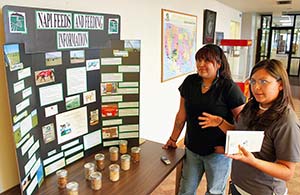An 'exciting' internship
Navajo Agricultural Products Industry Scholars learn new farming methods
By Alastair Lee Bitsoi
Navajo Times
FARMINGTON, Aug. 29, 2011

(Times photo - Rae Yazzie)
Navajo Agricultural Products Industry interns, from left, Chantle Begay and Alexendra Carlisle talk about the feeding information board they created.
This summer six Navajo Agricultural Products Industry Scholars studying at New Mexico State University got first-hand experience with a large-scale commercial farming operation.
Established in October 2008, the NAPI Scholarship Program is a partnership between NAPI and NMSU to develop a pipeline of Navajo professionals in the agricultural sector.
The current NAPI Scholars are Alexandra Carlisle, 20, Ryan Garcia, 23, Amanda Kerr, 20, Melissa McCray, 22, Theodore Rockwell, 38, and Rochelle Vandever, 23.
Chief Executive Officer Tsosie Lewis, an NMSU alumnus, said the program is part of NAPI's strategic plan to recruit an educated and highly skilled Navajo workforce to run the tribe's agribusiness enterprises.
"Young kids have to have an interest," Lewis said, adding that the scholarship recipients are obligated to work for NAPI upon graduation. So if they aren't serious about agriculture "it's a losing proposition," he said.
But that doesn't mean it's only open to agriculture majors. NMSU students studying business, civil engineering, plant and crop sciences, soil science, and statistics are also eligible.
Lewis said two of the four students in the first class of NAPI Scholars, awarded in 2009, have become permanent employees of the tribal enterprise: Lance Johnson, NAPI's small grains manager, and Melanie Herbert, a soil technician in the company's Agricultural Testing and Research Laboratory.
Joe Graham, NMSU director of Indian Resource Development, said the partnership with NAPI is helping meet the goal of his office - to work with Native students on campus and develop connections with their communities.
"We structured this program to develop and maintain a pipeline of Navajo professionals," Graham said. "NAPI is on the cutting edge and it's probably something other universities will probably seek to emulate."
To stay in the program, the scholars must maintain a minimum 2.5 GPA, do an annual internship with NAPI, and after graduation accept employment with NAPI "for a minimum of one-half the time of participation" in the scholarship program.
The university also places requirements on the NAPI Scholars aimed at keeping them involved in their school and on track to graduate.
Scholarship recipients receive $2,500 per semester and get $11.50 an hour plus housing, if needed, while interning at NAPI. The internships can be done during any semester when they are not in school.
Kerr, a sophomore studying agricultural business, said her internships with NAPI and Wilbur-Ellis, a leading international marketer and distributor of agricultural products, took her to Washington state and San Francisco.
"This is an internship program where you gain experience," Kerr said. "It's going to help choose which classes I will take this fall."
Kerr recommends the NAPI Scholarship Program for other prospective NMSU students interested in agriculture and says Navajo youth should consider contacting NAPI to do 4-H/Future Farmers of America projects.
For Vandever, a senior studying civil engineering, the scholarship program has provided the career launch that most new graduates can only dream about - in January she will begin full-time as a civil engineer under NAPI's Technical Service Department.
Like Kerr, she gained solid practical experience during her internships - this summer NAPI assigned her to examine farming development on Block 9, part of the farm's expansion plan.
To date, NAPI has irrigated blocks 1 through 8, or about 70,000 acres, of alfalfa, corn, wheat, beans and potatoes.
Once blocks 9, 10 and 11 are developed, the farm's irrigable acreage would increase to 110,630 acres, as envisioned in the 1962 enabling legislation.
"There's not a lot of internships on the Navajo Nation about water resources," Vandever said, adding that she has learned about NAPI's water system, including how much water is released through center pivot irrigation, which waters the crops from an overhead sprinkler wheeling around in a circle.
Vandever said she worked with a NAPI contractor, Trimble Technology, on Block 9 using GPS, lasers, optical and inertial technologies to determine the positioning of crops for better productivity.
"NAPI is (turning) to precision farming and working with different technology," she said. "It's pretty exciting."
In addition to individual projects, the interns were assigned a group project that gave them first-hand exposure to managing a crop from land preparation to product marketing.
Called the NMSU Pistol Pete Patch Proposal, the interns chose to raise Sorghum-Sudan grass, or "hay grazer," on their 49.3-acre patch. They picked the crop because it would yield 2.5 tons per acre, be sold to local markets, bring additional revenue from land-leasing fees, and also would help reduce nematodes, a soil pest that will destroy many crops.
Under the proposal, the interns learned the role of crop managers in proposing a budget for a field and a particular crop.
"They did a good job," said Aaron Benally, NAPI's potato crop manager.
He noted, however, that when the proposal went before upper management, it failed because the cost of post-harvest cleanup would have exceeded the net return generated by the crop.
"We were not going to get into something that was going to break us," Benally said.
"In just this summer, I learned a lot more in the field than in a lecture," Carlisle said. "NAPI is an experience within itself. It's a huge operation."
Now that their summer internship is over, the scholars are shifting focus to the new school year.
The NAPI Scholarship Program is limited to six students at a time. To apply, students must submit proof they are Navajo, be enrolled at NMSU's participating colleges, fill out the scholarship application including a letter stating their goals, and provide an official transcript.
Information: Beulah John, NAPI Human Resources manager, 505-566-2696 or bjohn@navajopride.com.

